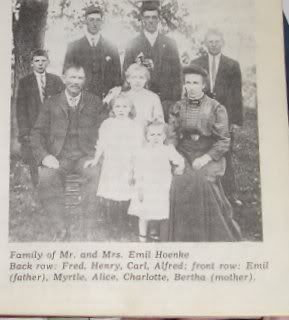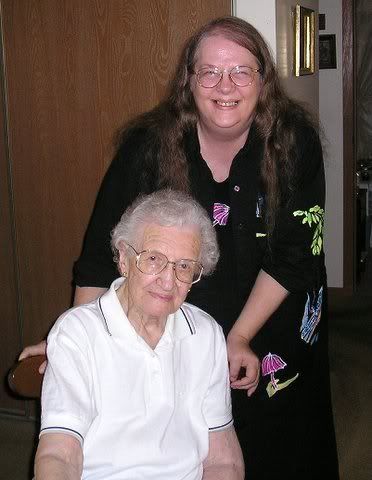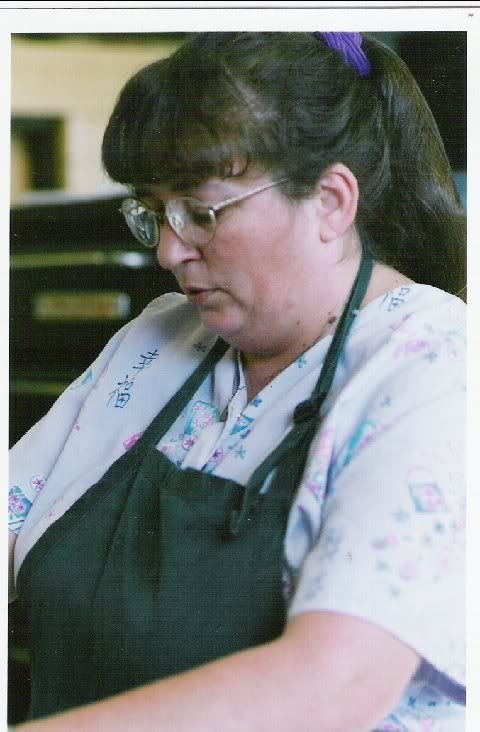Topic: u02d2 Roots
Date: August 5, 2006 7:17 PMSubject: In response to assignment from Ann Author: Garvey, Ann
Last edited on: August 5, 2006 7:29 PM
Stereotypes begin from past events and political people use these past events to "rationalize war, religious intolerance, and economic oppression" (Brehm, Kassin, & Fein, 2005). People form into social groups and there is always an us and them, or basically, the ingroup and the outgroup. Thinking about people this way helps us to distinguish the difference between self and an extended self and other(s). It helps us to understand more quickly because we can make generalizations without fully taxing ourselves. We make the differences more pronounced so we can gain a sense of comfort ability with our judgments. In the past, we needed to be more "vigilant" in not letting in "outsiders" (2005) like the sheep dog protecting the flock from the wolf.
We are impacted by group member beliefs of self and other. We tend to agree with our group, though most of us tend to think we are at least a little better than average within the group, and even if we choose the role of being "the bad guy," we still want to be the good "bad guy". Good guy and bad guy mentality is our personal internal means for conceptualizing why people learn to value self and hate the other. I have a son who if asked will tell you he "hates potatoes." He was never forced to eat potatoes, but somehow by stating his firm hatred of them, he feels a little safer in being potato-free. When I was young, I hated pizza. I took pride in the fact I was the only one in my family (ingroup) who didn't like pizza. On pizza night I got spaghetti. When I went away to school my friends loved pizza. I started to eat pizza and continue doing so to this day. I still don't like my family and I wouldn't share a pizza with them. It was a situation that if I were like them, I couldn't value myself. I didn't want to identify with being a member of the family. My son loves his family, but he thinks potatoes are bad. I thought that was interesting. We'll move on now.
People range in their expectations of whether it is ok for members of groups to be similar or different. It seems to be an evolutionary feat if you can see things differently and still fit in. Back in the day of Archie Bunker my father learned to say things like "That's the problem with all yous … you all think alike …" Neither Archie or my father were very open-minded people. My father carried his hatred of people from social and racial groups to his deathbed. He stated that he lost his respect for my education when I started studying people that "were different," or "those people." My father didn't think it was ok for people to think differently than him. He'd say, "See, that is another reason I don't like you, I don't want you to think, I'm the father I just want you to listen. People don't respect their parents anymore." Brehm, Kassin, & Fein (2005) state that the more individuals in each group interact between groups, share goals and outcomes, and find commonalities, the less rigid will their thoughts of others be (2005). I surely would hope that to be the case.
Where stereotyping is the way we think about others, prejudice is the negative feelings toward others (Brehm, Kassin, & Fein, 2005) and discrimination is the negative behaviors we have against others. The largest cause of negative feelings and conflict is when we are in competition with each other (2005). The losers then feel frustrated and resentful, and the winners feel threatened and self-protective (2005). In a previous paper we wrote about the United States being the large fish in a small pond. In response to that statement a commenter wrote that the US is also a large fish in a big pond. The sense I am trying to distinguish is that while the US is an important fish due to its ability to contribute to global consequences, it is still relatively a small fish by numbers. In reality, US is placed in a worse position over the last few months because not only were we not big enough to go in and out of Iraq the way our government had intended, we are now facing the consequences of more Middle East conflict and countries are making decisions to fight on the US side or against it and the fights are in populated cities rather than in boardrooms.
In the past it has seemed that more people admired the US than might be the case now. Where we began as a "melting pot," it seems that we are very sure of our need to close borders. Because the US is in Iraq it caused a lot of negative feelings from many other countries including the one it had just invaded. Since September 11th the US has taken a stance of one threatened and in need of self-protection and they convinced or excused themselves by taking the offensive in a far away place, as defense of their near place, or homeland. This may or may not have been a realistic argument. The closer to feelings of being life threatened, the more apt we are to build-up our selves and tear-down the other.
Sexism makes a point of combining both prejudice and discrimination as it is based on gender" (Brehm, Kassin, & Fein, 2005). The author's explain the many different ways we teach children from the first days to be more feminine or masculine by the way we define and protect them. As a mother of three boys, I was fairly attuned to activity. My oldest son and his wife managed to have two girls. We have defined all along our oldest granddaughter who is now five with one consistency. We've stated often and for the record she is a very bouncy child, which is interpreted to say she's very active. Sometimes I watch her thinking of how I was raised with the script of little girls being seen, but not heard. I rather like that she jumps on my couch. In my heart, I figure that she is ok and of a new and better generation. I marvel at her assertive ability, though I still think neither of us is ready for formal restaurants.
Our perceptions assume general characteristics, which assist us in building gender stereotypes of self and others and in establishing our biases. Gender stereotypes prescribe differences in gender rather than describe (2005). Or, in other words in the case of gender the buggy precedes the horse and in this case we tend to conform. I'd like to think that we can progress the generations and make conscious choices and through prescription better elicit the kind of people we would like to become. This is particularly important with the addition of generations. I enjoy listening to our Grandmother talk of things long ago (she's 98). She discontinued her education at the 8th grade, so she could work with her aunts in the cook trailer that would stay out in the field with the farmers and farm hands. No one would have thought to ask her if she was self-actualized. What is exciting is to ask her now her perception of things. She doesn't understand computers, but she reads the newspaper everyday and keeps up with her sports teams. Her perception of herself is to be very independent. She leads my vision as a role model. I think she would say sexism starts and ends in ones perception of self.
Racism is defined by Brehm, Kassin & Fein (2005) as a disease or "a subtle form of prejudice that surfaces in direct ways whenever it is safe, socially acceptable, or easy to rationalize." They further state that "feelings of hostility, fear, and distrust" divide groups, which are further affected by "little contact, strong negative emotions and anxieties about appearing racist" (2005). We took a course prior to this one for multicultural psychology. The first assignment we were to read five short chapters where the authors tore badly into White Americans for their racial views. We denied like other White students any such identity with the White Americans mentioned in the book. I thought of all the credits I'd earned through life toward good relationships with others who were different. One of the first things I remember hearing was that I'd held a classic racial viewpoint thinking we should just treat all people the same. In fact, all people are different and any idea less simplistic than that, particularly involving cultures, is wrong thinking.
Wellman (2000) describes racism as holding the belief that one race is superior than another and would include the concept of White privilege. Wellman's (2005) work argues against considering racism as a personal illness. He takes the view that racism is a social problem propagated by political systems to control groups of people who aren't the party "in charge." Wellman did not think that racism should be considered a matter of perception/misperception because racism is rather along the lines of "practices, hierarchy, domination, or exclusion" (2005). He believed that using the medical model would perpetuate the problem, and in consideration of racism as an addiction, Wellman believed calling it an addiction would only serve to separate control over the phenomena to an individual compulsion rather than more properly as a circumstance of social wrongdoing (2005).
If a stereotype holds the theory of there being an us and a them, then the medical community would be the "us" and need to assume care over "them," the racial victim, which puts the beliefs in check without overtaxing the given system. This also might ease the consciousness of those concerned with morals. Essentially, "It is out of our hands now." We could collectively hate racism and feel satisfaction in welcoming the former racist back into the fold after the disease was removed. He would say, "I didn't mean to be a racist, I never wanted to be a racist, it's something that just happened to me. It is bad, please forgive me, I am good."
It is normal for Americans to be racists, and it is even better not to be caught. Recently, Mel Gibson had trouble with racial slurs he made while being arrested for being over the legal alcoholic level. While in his inebriated state he let it be known that the war had been started by Jewish people and he had doubts as to the character of the policeman. Mel's father held the belief that there were no 6 million Jewish people massacred. That was a lot of power to yield in making those 6 million deaths appear unreal. Mel also took a commanding role. He let it be known that he and his people were in control of the city and that the policeman who stopped him was going to take responsibility for what he had done to (a very important person) him. It was as if he stated, "Drunk? Don't tell me what you think, I am going to tell you how it is!" After Mel was released he started his medical-modeled "treatment."
Brehm, Kassin, & Fein (2005) state the treatment for racism is to establish the conditions of equal status, personal interaction, cooperative activities, and social norms. In the case of Mel Gibson, both alcoholism and racism must be cared for. Gibson did his best to throw himself at the mercy of the Jewish people. "Tell me what I have to do to change." By doing so he hoped to achieve perhaps not equal status, but leveraged status where he would subordinate himself to the other. His request would then personalize the interaction so that he would be dealing with one or a smaller group of Jewish people rather than the whole Jewish nation. Gibson held the belief that together he and the Jewish people could work together to resolve longstanding issues and to state new social norms. Or, at least this might seem the implication.
We have a very integrated worksite, though the power distribution is poorly integrated. The center is owned and organized by Roman Catholic Italian nuns. They and the administration, including myself, are all four White Americans. The participants at the center are primarily Hispanic Americans and African Americans. About half the staff are Hispanic Americans and there are no African American staff, though there have been. If we were to reduce prejudice, discrimination, or sexism, we would have to change our chief Administrator. While she does not exert overt racial thoughts, feelings, or behaviors, she does exert a superiority by means of her clergy status and force. None of the Administrative team, staff, clients, parents, or others are immune from it. Because she focuses attention on doing so many good things for the center, and due to respect of her age (80 years old) no one defies her more aggressive tendencies. Her behaviors acted out have been the fault of many staff who have left the organization. Because nuns are in such short supply, if the center is to remain open, we need to accept what is provided. In my own position I work hard to be aware of the natural fallout of anger pressed upon administrative team, staff, and clients by the administrator. We find in that particular situation, we are all equal and work together to bolster better goodwill.
References
Brehm, S. S. Kassin, S. & Fein, S. (2005). Social psychology. Boston: Houghton Mifflin.
Wellman, D. (2000). From evil to illness: Medicalizing racism. Abstract retrieved August 5, 2006 from EBSCOhost database.
This is the one where we weren't sure if we were going to still be a student ...
This is a good idea ... just gotta keep workin ... just keep workin.
















